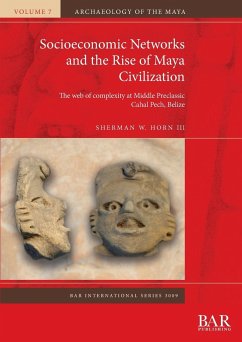
Modeling Socioeconomic Evolution and Continuity in Ancient Egypt
The value and limitations of zooarchaeological analyses
Versandkostenfrei!
Versandfertig in 1-2 Wochen
68,99 €
inkl. MwSt.

PAYBACK Punkte
34 °P sammeln!
This work examines patterns of taxonomic utilization from a wide range of sites from different geographic regions and through several thousand years in order to contribute to an eventual understanding of the mechanisms by which disparate regional societies were subsumed into the unified Egyptian 'state.' An examination of the relative adaptability of cattle, sheep, goat, and pigs is fundamental to understanding the choices by humans for exploiting a particular species or its products in a given area. A predictive model was developed based on issues of economic and social production among moder...
This work examines patterns of taxonomic utilization from a wide range of sites from different geographic regions and through several thousand years in order to contribute to an eventual understanding of the mechanisms by which disparate regional societies were subsumed into the unified Egyptian 'state.' An examination of the relative adaptability of cattle, sheep, goat, and pigs is fundamental to understanding the choices by humans for exploiting a particular species or its products in a given area. A predictive model was developed based on issues of economic and social production among modern societies utilizing these same domesticated taxa under similar environmental conditions. Five strategies were identified: nomadic pastoralism, semi-nomadic pastoralism, transhumance, agro-pastoralism, and ranching. Contrary to previous interpretations, pigs were shown to be well adapted to utilization by sedentary populations in both the southern Valley and northern Delta regions. The methods for the investigationof alternatives of social and economic production and intensification were closely linked to zooarchaeological analysis. However, in addition, faunal inferences were supplemented with evidence such as artistic depictions, Egyptian texts, and literature.














